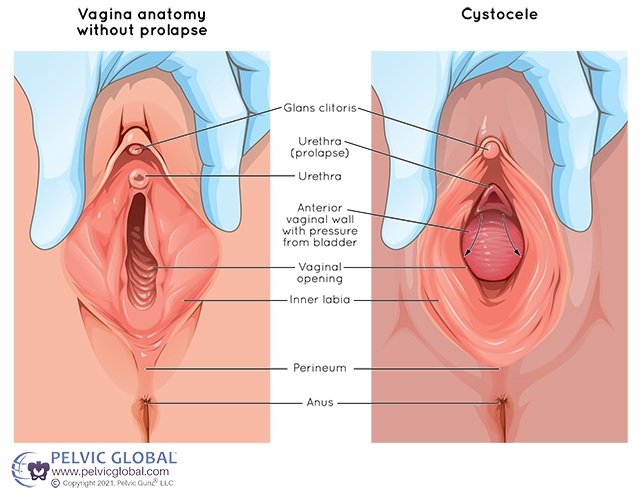PROLAPSE
Pelvic Organ Prolapse is the descent of one or more of your pelvic organs, which can include the bladder, uterus, and/or the rectum. If a woman has had a hysterectomy it is also possible to have small intestine prolapse.
We have very high level evidence supporting pelvic floor physical therapy as a first line of treatment in this population. In the international urogynecological journal they found that with supervised physical therapy patients largely reported
decreased symptoms of pressure and heaviness
narrowing of the vagial hiatus
physiological change in the bladder neck, and position of the bladder.
Clinically, minimizing these symptoms helps empower women to return to their desired physical activity with more confidence.
How do you know if you have prolapse ?
You may see a Visual bulge. Size or position of the bulge may change with activity.
Symptoms: pelvic heaviness and pressure especially with increased physical activity, incomplete bowel emptying, urinary or fecal leakage, inability to keep maintain a tampon, feeling like organs are falling
Screening: the importance of seeking medical attention
It is important to rule out other systemic causes such as cancer, cysts, or fibroids. It is also important to have an evaluation when you first notice these concerns in order to address prolapse at it’s earliest onset. Pelvic physical therapy should always be part of the initial conservative management. In most states you can go see a Pelvic PT direct access without a medical referral.
Top 3 tricks to alleviate symptoms:
Lay on your back with legs extended up the wall to take pressure off the pelvic organs
Manage constipation and reduce straining to decrease strain on the ligaments that support the pelvic organs
Avoid heavy lifting until you are cleared by your provider
Risk factors for prolapse:
Obesity
Childbirth: prolonged pushing, tearing, episiotomy, vacuum extraction, large babies
Ligamentous laxity and/or history of chronic subluxations or other connective tissue disorders
History of high volume of impact exercise
Chronic constipation
What do I do if I have prolapse?
We recommend seeing a physical therapist that specializes in pelvic health. Our clinic offers in person and virtual consults
We also offer an on-demand 12 week postpartum class. Our class was designed specifically for women that have prolapse. We know that you may have specific questions or need modifications which is why we include regular online LIVE support by our specialty team of pelvic PTs.
Postpartum is for life, this class is appropriate for anyone between 4 weeks and 15 years postpartum.
To learn more follow us on instagram and facebook!
Bø K. Pelvic floor muscle training in treatment of female stress urinary incontinence, pelvic organ prolapse and sexual dysfunction. World J Urol. 2012 Aug;30(4):437-43. doi: 10.1007/s00345-011-0779-8. Epub 2011 Oct 9. PMID: 21984473.

